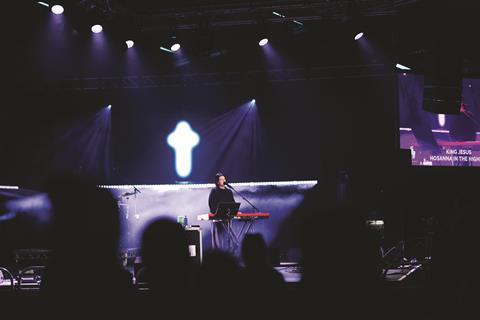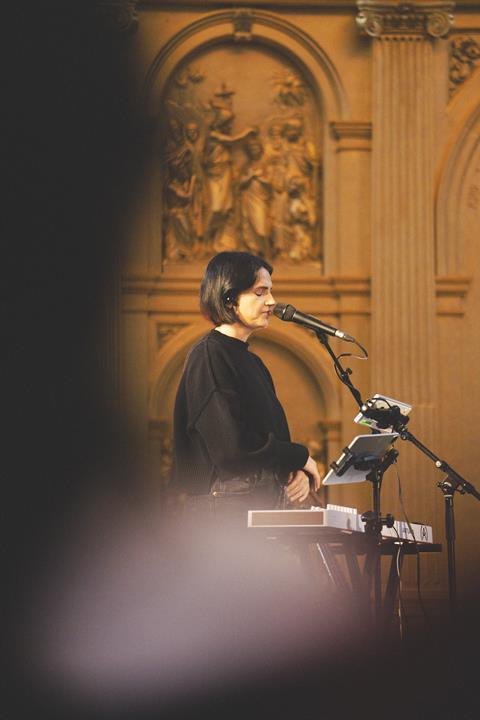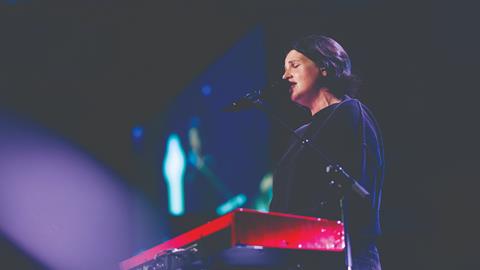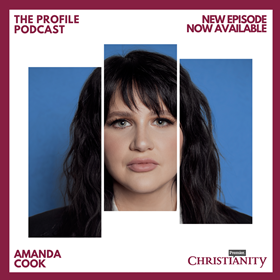The writer of Bethel Music’s ‘You make me brave’ is often described as a worship leader. But it’s not a label Amanda Cook has ever felt comfortable with. She discusses incense and stillness, her helpful ADHD diagnosis and hitting your stride in your 40s
I’ve just witnessed Amanda Cook simply playing piano in front of 300-odd Creation Fest volunteers, gathered in a small room to spend a few quiet moments with Jesus before the busyness of the Cornish Christian festival kicks off. Soon, Cook will take to the main stage to headline the first night, this time playing for thousands. But I’ll be struck by how startlingly similar both sets are – and how similar Cook is in both settings.
You might expect this Canadian singer-songwriter, who spent several years at Bethel Church in California writing worship hits such as ‘You make me brave’ to go for the rousing, big-band sound that we’ve come to expect from US megachurches, but Cook takes to the stage alone. Just her, a piano and a coil of smoke, slowly rising from the incense she’s burning on stage.
Cook says it has taken her a long time to find the place from which she feels comfortable sharing her music. But maybe this is it: stripped back and intentionally low-key. Dressed casually in black, she seems a million miles away from much of what epitomises the glamorous world of the US Christian music scene.
Having grown up on a farm in the small town of Niverville, Canada, Cook tells me that playing music in front of huge crowds was “never the goal”. Instead, it was her medicine. The only way she knew how to quiet her anxiety and “cut through the vitriol” in her mind. Her early solo releases won multiple awards and in 2014, she moved to California and joined Bethel, the church famed for its signs and wonders ministry and worship anthems.
Intensity is not intimacy. Intimacy comes in the quiet moments
The following year, she married Jacob Cook, but their marriage later ended. In 2019, Jacob admitted “emotional infidelity” in a social media post. Very little has been made public about the divorce, and Cook understandably prefers not to speak about the intricacies. But it must have been tough, considering the world they moved in and the expectations that came with it. To deal with her grief, she spent a lot of time in the UK, taking time to be quiet and meeting God in the nature of the English countryside and “just sitting in a chapel that’s older than America”. Today, she trusts God more than ever, she tells me, but her reassurance is no longer based on “my ability to hold onto my faith. It’s in his ability to lead me.”
It has been a long journey – and one that is common for many women, we ruminate – towards a place where Cook now feels she can use her gifts and talents to serve the Church “without apologising and explaining constantly”. A recent diagnosis with ADHD has helped with this. At last, aged 40, she finally feels comfortable with what she can and can’t manage. Playing music in front of people no longer feels like inviting them into her open-heart surgery, she says.
When watching a talented musician, speaker or leader doing what they are so obviously gifted by God to do, we rarely stop to ask if, like Moses, they ever felt ill-equipped for the job. Or whether the expectations, assumptions or models of how we assume it ‘must be done’ sit comfortably with them. Maybe if we did, we might see fewer burn out or mess up and more, like Cook, begin to lead in the freedom and creativity of what God has gifted them, uniquely, to do.
There is a temptation to assume that the people we see on a platform never struggle with anything. How do you deal with those times when it’s hard, but you’re having to lead worship?
Growing up, I didn’t know the titles of things. Even ‘worship leader’ – to me, those words felt very heavy. I used to wonder: Was it because I’m afraid of responsibility?
Music was my only medicine for the disorder in my mind for most of my life, until two years ago, when I had a late diagnosis of ADHD, which often happens for women especially. I was clinging to music as sanity for myself, and so I had a really hard time playing in front of people, because it felt like letting them watch me self-regulate.
There is a gift in the innate vulnerability of artistry. We feel that connection to the struggle that artists have and that they work out on the page, in their painting or in their music. But I always felt on the back foot with that, because I was learning how I felt in real time, while everyone else was watching – and that just didn’t feel safe.
I’ve been in therapy for years, and that’s been immensely helpful. Now, I’m able to share something that I love, and embrace the cost. With music, I long to create stillness for people to have their own clarity of thought and space with God.

Has that stillness been hard for you to find at times?
Yeah, it’s impossible without the help that I have. But now I invite people into the things that I do in my own home: burning incense, reading something, playing – very simple, tactile things.
There’s a sense of worship leading in that, but whatever it’s going to look like in my life, it’s going to be bespoke. It’s going to funnel through the way that I’m wired. It’s going to be a different kind of leading than maybe what’s expected.
Do you feel comfortable with the label ‘worship leader’ now? Is that how you would describe what you do?
I don’t know if I’ll ever feel comfortable with that.
Do you feel called to it?
I feel compelled.
I studied music – that’s where I put my 10,000 hours in – so I want to offer that, but I feel hesitant to put myself forward as a certain kind of representative. I feel hesitant about being the face of a brand of God, I guess.
So you never planned to become a famous Christian recording artist?
Not at all. I always knew I wanted to make music. Performing music was just what was offered. It was the next step, so I just kind of took it.
Growing up in Canada, ‘worship leading’ isn’t a career path. ‘Worship’ is not a genre of music, it’s a way of life. My parents put me in piano lessons when I was four, and my first piano teacher, Jane, led the music at a church. We would go to those gatherings and I remember feeling: Whatever this is, I would like to be part of it.
I love being in the studio. I will probably make music one way or another until I die, but it might not look like what I’m doing now.
It sounds like you’re in a place where you’re much more comfortable with who you are, what you’re doing, how you see your faith…
Yeah. I mean, I heard the rumours about being a woman and getting older, and how we start to embody what our path is without apologising and explaining ourselves constantly…so, yeah, I think so.

You mentioned that you were recently diagnosed with ADHD. How has that impacted you?
Um, it’s immense. There is a wash of relief, and then 38 years of grief, for not knowing what I was wrestling with.
I was constantly comparing myself to neurotypical people, who could wake up with dopamine at 7am and stay focused. I just didn’t know a day like that until I got on medication. I had these practices: gratitude journaling, morning pages, therapy, walking, nutrition, hydration, but they were just keeping me from drowning.
I long to create stillness for people to have their own clarity of thought and space with God
It just feels like: I’m doing nothing. I’m lazy. All I know is procrastination and time blindness. It’s very debilitating. And the rest of the day is spent recovering from my own mind. It’s all happening internally and it’s really hard to articulate.
In the 90s, when I was growing up, ADHD was largely considered to be [something that affects] little boys. So it’s really hard to go: Wait, I can have a clear thought? I can follow through on something?
I can forget where I am and what I’m doing very quickly, including on stage. Suddenly I’m thinking about what I want to eat after, and I don’t remember lyrics.
There’s no magic pill for any life, but medication helps my brain retain information and slow down enough to be present.
What would you like the Church to do differently to help people who are neurodiverse?
Oh, man, too many things!
When I go to churches in Europe, I walk in and feel this stillness. I sit down, light a candle and breathe. Nobody tells me what to think, invites me to a small group, or tries to get me to sign up for a list. I’m not bad-mouthing those things – they are all attempts at connection with people, at the end of the day, and the Church is people. But for me, going into any loud environment, be it a show, concert, crowd or church – because a lot of churches present in that way – is overstimulating and overwhelming. Sometimes I need a quiet space to regroup, and that’s alright.
My friend said that in the 80s, the Church’s response to apathy was to make church more exciting – and now we’re paying for that with our anxiety. The noise threshold is so high, it’s like we’re trying to be noisier than the noise. We’re competing with culture rather than being comfortable with the uncomfortability of something different, like a pocket of stillness in the middle of a very busy world.
If I’m anxious, I’ll lead people through anxiety, with anxiety. If I have peace, I can offer something different, and I can let people be OK with walking out. We’ve got so afraid of losing people’s attention that we try to keep it really exciting. But the human heart is made for a more expanded view.

And, actually, people know what to do. Anytime I go into a church in Europe, all these visitors from all around the world, we all know what we’re here for. We are all looking for stillness. We’re looking for peace, and it’s readily available.
I’m not tearing one thing down to elevate another. All these things have met people where they need to be met. I just think we’re longing for a more holistic picture of faith that we can practise in our normal lives, in ordinary interactions and conversations, through the five senses.
I love lighting incense. Scent is memory, so it brings me back to the centre and focuses me in prayer. A lot of times, I try to think my way into prayer. And part of it is me bringing all my thoughts, handing it over and going: OK, here’s my anxious brain that’s looping on all these terrifying ideas and things that might never happen. God, I’m giving you my mainframe to rewire it and clean it up and help me. That’s what renewing our mind looks like, right? That’s where change happens.
When you let things move towards stillness, you can feel the elasticity of: Who’s the most anxious right now? Is it the church leader? Are we going to run with [this stillness]? We have programmes that we know how to do. That’s good; it’s stabilising. That’s why I love the Book of Common Prayer. That’s why we love worship songs. But what do we do when there’s a silent moment? Are we able to hold space for God to speak?
You get to travel to lots of different places. Do you have a sense of something that God’s doing at the moment?
My compulsion towards obsession has always been motivated by trying to eclipse the overwhelm in my brain. I can hyper-fixate on anything – a skincare routine, a colour, a person, God. Learning that was really incredible, because I didn’t realise I had been limiting the idea of God to an obsession.
Along with the obsession was fear that I was missing out on whatever God was doing. He’s over there, or he’s over there – which he is, but he is also right here. Healing, to me, feels like not needing to hyper-fixate. It feels like being able to be in the ordinary. I’m learning: Oh, you were with me the whole time! I’m running over there to try to experience the thing that people are talking about, but he was with me on the plane. He was with me at home before I left. He’s with me now.
Intensity is not intimacy. Anyone in a relationship knows that. Intimacy is in the quiet moments: in making coffee and reading the paper and comfortable silences. It’s the quiet stillness of being observed, being beheld, experiencing the with-ness and witness of true friendship.
Is it hard to hold on to that sense of intimate relationship with God when you are a Christian leader who has profile, who is travelling a lot and on big stages all the time?
I have routines and rituals that are very simple. I went for a walk this morning. I light incense. I do gratitude [journaling] every morning.
One of my friends recently said that you can confuse momentum with grace, and they’re not the same things. Grace is a daily thing. When you’re intimate friends with someone, you carry that everywhere you go. Jesus is the best friend I’ve ever had. I used to try to explain Jesus, and now I feel less and less like explaining. It’s tough to explain a love that feels so complete and giving and steady and secure, but I live in it.
Intimacy, over a long period of time, means living in that space and letting it affect us. It’s funny, because my name means “worthy of love” and I’ve always struggled with that. Then, last year, I saw a different definition that said: “She who must be loved.” When you come into contact with someone who knows that they’re loved, it’s compelling. Like: What water are you drinking? Where are you getting that from?
I hope that comes through whatever artistic means I end up making music through – call it worship leading, call it whatever you want. As I get older, that’s the long view: to reach into the imagination of people. It doesn’t matter how distracted our culture gets, we’re always going to have this human longing and imagination.
I have great hope in the longing that we have for Jesus and for the affection of God that still holds and will hold, no matter what.
To hear the full interview listen to Premier Christian Radio at 8pm on Saturday 28 September, or download ‘The Profile’ podcast
Amanda Cook was performing at Creation Fest, a free gospel-centered festival in Cornwall. For more information see creationfest.org.uk









































1 Reader's comment